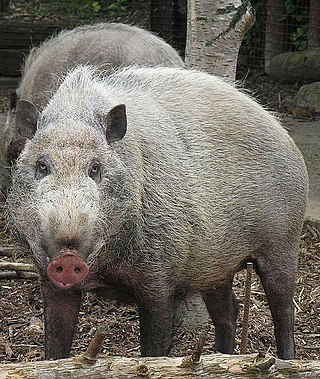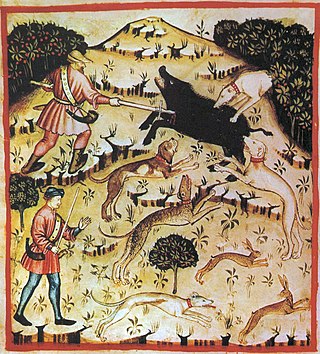Boar may refer to:
Boar may refer to:

Sus is the genus of wild and domestic pigs, within the even-toed ungulate family Suidae. Sus include domestic pigs and their ancestor, the common Eurasian wild boar, along with other species. Sus species, like all suids, are native to the Eurasian and African continents, ranging from Europe to the Pacific islands. Suids other than the pig are the babirusa of Indonesia, the pygmy hog of South Asia, the warthogs of Africa, and other pig genera from Africa. The suids are a sister clade to peccaries.

The wild boar, also known as the wild swine, common wild pig, Eurasian wild pig, or simply wild pig, is a suid native to much of Eurasia and North Africa, and has been introduced to the Americas and Oceania. The species is now one of the widest-ranging mammals in the world, as well as the most widespread suiform. It has been assessed as least concern on the IUCN Red List due to its wide range, high numbers, and adaptability to a diversity of habitats. It has become an invasive species in part of its introduced range. Wild boars probably originated in Southeast Asia during the Early Pleistocene and outcompeted other suid species as they spread throughout the Old World.
Hog or HOG may refer to:
A circus is a traveling company of performers that may include acrobats, clowns, trained animals, and other novelty acts.

The guinea pig or domestic guinea pig, also known as the cavy or domestic cavy, is a species of rodent belonging to the genus Cavia in the family Caviidae. Breeders tend to use the name "cavy" for the animal, but "guinea pig" is more commonly used in scientific and laboratory contexts. Despite their name, guinea pigs are not native to Guinea, nor are they closely related to pigs. They originated in the Andes region of South America. Studies based on biochemistry and hybridization suggest they are domesticated animals that do not exist naturally in the wild, and are descendants of a closely related cavy species such as C. tschudii. They were originally domesticated as livestock for a source of meat, and are still consumed in some parts of the world.

The Pig or sometimes translated as the Boar is the twelfth of the 12-year cycle of animals which appear in Chinese zodiac, in relation to the Chinese calendar and system of horology, and paralleling the system of ten Heavenly Stems and twelve Earthly Branches. Although the term "zodiac" is used in the phrase "Chinese zodiac", there is a major difference between the Chinese usage and Western astrology: the zodiacal animals do not relate to the zodiac as the area of the sky that extends approximately 8° north or south of the ecliptic, the apparent path of the Sun, the Moon, and visible planets across the celestial sphere's constellations, over the course of the year.

Suidae is a family of artiodactyl mammals which are commonly called pigs, hogs or swine. In addition to numerous fossil species, 18 extant species are currently recognized, classified into between four and eight genera. Within this family, the genus Sus includes the domestic pig, Sus scrofa domesticus or Sus domesticus, and many species of wild pig from Europe to the Pacific. Other genera include babirusas and warthogs. All suids, or swine, are native to the Old World, ranging from Asia to Europe and Africa.
Buck may refer to:
The tiger(Panthera tigris) is the largest cat species.

A feral pig is a domestic pig which has gone feral, meaning it lives in the wild. The term feral pig has also been applied to wild boars, which can interbreed with domestic pigs. They are found mostly in the Americas and Australia. Razorback and wild hog are Americanisms applied to feral pigs or boar–pig hybrids.

The pig, also called swine or hog, is an omnivorous, domesticated, even-toed, hoofed mammal. It is named the domestic pig when distinguishing it from other members of the genus Sus. It is considered a subspecies of Sus scrofa by some authorities, but as a distinct species by others. Pigs were domesticated in the Neolithic, both in East Asia and in the Near East. When domesticated pigs arrived in Europe, they extensively interbred with wild boar but retained their domesticated features.
Sounder may refer to:
A goat is a mammal.
An ox is an adult male bovine.

Pigs, widespread in societies around the world since neolithic times, have been used for many purposes in art, literature, and other expressions of human culture. In classical times, the Romans considered pork the finest of meats, enjoying sausages, and depicting them in their art. Across Europe, pigs have been celebrated in carnivals since the Middle Ages, becoming specially important in Medieval Germany in cities such as Nuremberg, and in Early Modern Italy in cities such as Bologna.

Boar hunting is the practice of hunting wild boar, feral pigs, warthogs, and peccaries. Boar hunting was historically a dangerous exercise due to the tusked animal's ambush tactics as well as its thick hide and dense bones rendering them difficult to kill with premodern weapons.
A pig is a mammal of the genus Sus.

The Chinese zodiac is a traditional classification scheme based on the Chinese calendar that assigns an animal and its reputed attributes to each year in a repeating twelve-year cycle. In traditional Chinese culture, the Chinese zodiac is very important and exists as a reflection of Chinese philosophy and culture. Chinese folkways held that one's personality is related to the attributes of their zodiac animal. Originating from China, the zodiac and its variations remain popular in many East Asian and Southeast Asian countries, such as Japan, South Korea, Vietnam, Singapore, Nepal, Bhutan, Cambodia, and Thailand.
A wild pig may be: